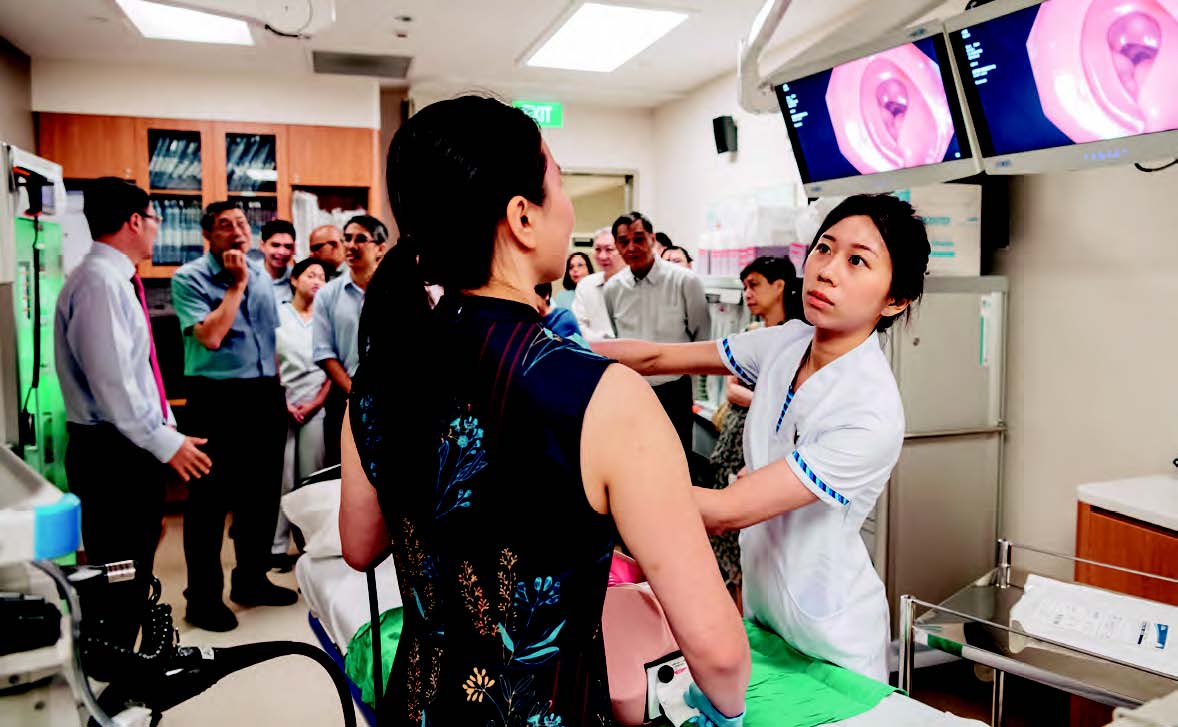
Colorectal surgeons and other staff demonstrating how colonoscopy is performed at the event to mark the launch of the SPRUCE Fund.
A new fund to help low-to middle-income patients who need but are unable to afford colonoscopy has been launched.
A change in bowel habits, including an inability to empty his bowels completely at times, raised the red flag for Mr Rizal Saibi two years ago. He felt bloated even after a light meal, while a good night’s sleep did little to lift his lethargy.
After finding blood in his stools in May 2019, Mr Rizal sought medical attention at the Singapore General Hospital (SGH), where he was advised to undergo colonoscopy. The procedure is an examination of the rectum and lower bowel to detect colorectal cancer.
A colonoscopy costs about $1,000 after government subsidies. As Mr Rizal is supporting two children through tertiary education, and his elderly mother-in-law, who has medical needs, forking out that amount is a tall order.
Furthermore, he is not eligible for MediFund, a safety net for patients who have difficulty paying for their remaining bills after receiving government subsidies and drawing on other means of payment, such as MediSave.
Giving back
 To mark SGH’s Department of Colorectal Surgery’s 30th anniversary last year, it set up the SPRUCE (SGH Preventing Rectal and Colon Cancer through Endoscopy) Fund to help patients like Mr Rizal.
To mark SGH’s Department of Colorectal Surgery’s 30th anniversary last year, it set up the SPRUCE (SGH Preventing Rectal and Colon Cancer through Endoscopy) Fund to help patients like Mr Rizal.
“The SPRUCE Fund is our department’s way of giving back to the community, which we have been serving since 1989,” said Associate Professor Emile Tan, Head and Consultant, Department of Colorectal Surgery, SGH.
“With the support of partners and generous donors, we are able to start helping patients in need. We hope more individuals and companies can be part of this meaningful initiative by contributing generously.”
The department aims to raise $300,000 through the fund to help an estimated 300 patients over the next three years, and heighten awareness of colonoscopy as an important examination, particularly for those aged 50 and above.
Between 2011 and 2015, 9,807 new cases of colorectal cancer were diagnosed, making it the most common cancer in Singapore. Each year, the department performs approximately 10,000 to 12,000 colonoscopies, and treats hundreds of patients with colorectal cancer.
According to the Gender differences in predictors of colorectal cancer screening uptake: a national cross sectional study based on the health belief model study published in 2013, 90 per cent of 1,700 Singaporeans agreed that colonoscopy can save lives, and 80 per cent felt that it was too expensive. Only one in four people went for the procedure.
To mark the launch of the SPRUCE Fund, a special colonoscopy drive was held at SGH’s Ambulatory Endoscopy Centre on 31 August 2019. That day, 50 patients underwent colonoscopies performed by 10 colorectal surgeons from the department.
%20LR%20pic3.jpg) Often there are no symptoms in the early stage of colorectal cancer, which can involve the large intestine (colon) or rectum (end of the colon). According to the National Registry of Diseases Office, more than half of patients are diagnosed when the cancer has already reached stage 3 or 4, which reduces effectiveness of treatment and chances of a cure. An average of 780 patients lose their lives to colorectal cancer each year. Most colorectal cancers develop from polyps or pre-cancerous growths in the large intestine. The faecal immunochemical test (FIT) picks up tiny amounts of blood in the stool, which can suggest polyps or cancers even in patients who do not display symptoms. A positive FIT test may warrant further investigations and a colonoscopy, the gold standard for colorectal cancer screening. During the procedure, the doctor will attempt to remove any polyps found in the colon and rectum. Patients with symptoms, such as rectal bleeding or a sudden change in their bowel habits, may be referred directly for colonoscopy without a positive FIT test. Those whose relatives have been diagnosed with colorectal cancer have a bigger likelihood of developing polyps and cancer. |













 Get it on Google Play
Get it on Google Play